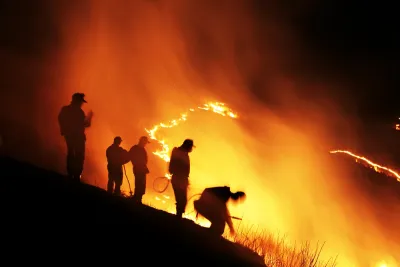Through the first six months of 2014, some Planetizen posts proved less than enticing to our readers. Instead of dwelling on that distinction as ignominious, let's consider how these neglected few might provide insight into the planning discussion.

As the managing editor of Planetizen, I waver between engaged and obsessed with the traffic on our site, so I notice when a post fails to attract readers. Acknowledging the folly in speculating too much on the psychology of a readership as broad and diverse as Planetizen's, as an editor it is still my job to be brutal in my assessments of the value of our posts.
But for quite different reasons, shouldn't a group of professionals, academics, students, and otherwise passionate observers like the Planetizen readership also be willing to consider what stories they've collectively neglected and why that might be?
If you are one of the readers who neglected some (or all) of the stories included on the list, please do not take this post as a passive aggressive insult to the level of your interest or your intellect. Rather, consider it a bit of insight into the pulse of the planning conversation (however weak that pulse may be on some of these issues).
Considering that we posted over 1,450 times in the first six months of the year, I'll forgive a few posts for lacking the "newsy" characteristic that makes some of the best stories from the year so compelling. It's also possible that in some of these cases, universal problems didn't translate to state or local examples well enough to be of interest to a larger readership.
Or maybe, more dangerously, our frustration with the difficulty presented by some of these stories has gotten the better of us, and we'd like to keep our heads in the sand.
If that's so, and just in case it is, then consider this post a call to arms.
Among the many articles, blog posts, and features posted on Planetizen between January 1 and June 30, 2014, here are the least popular, ranked from unpopular to unpopularest:
10) Colorado Foreclosures Hit Ten-Year Low
9) Aging Natural Gas Infrastructure Suspected in Deadly NYC Explosion
8) Congress' Head-in-the-Sand Approach to Fire Management
7) California Fracking Moratorium Bill Dies; Proponents Vow to Press On
6) Safety Program Launched to Combat Distracted Driving in I-95 Work Zones
5) New Report May Provide Green Light for Keystone XL
4) EPA Releases Carbon-Cutting Rule for Existing Power Plants
3) Should NYC's Community Boards Have Term Limits?
2) Labor Unrest Surrounds Transit Systems in Brazil on the World Cup's Opening Day
1) Fight Fires with Funds: New Federal Funding Mechanism Proposed for Wildfires
Given the many possibilities mentioned above for why these posts might be unpopular, or just dumb luck, I'm not surprised to see some of them on the list. Others, however, are more perplexing.
The first surprise is the third least popular post, "Should NYC's Community Boards Have Term Limits?" Posts about New York City tend to do very well on Planetizen (hence the entrenched position of the New York City tag on the top of the Planetizen trending list), so it's surprising to see a post about planning in New York City on this list at all. But the more surprising aspect of this post's relative unpopularity is that posts about community engagement in the planning process also tend to do very well on Planetizen. In fact, all of the most popular posts from the first three months of this year had some or everything to do with community engagement. So why is it that a controversy (with implied generational conflict!) over citizen participation in the planning process at the neighborhood level in New York City, covered by the Wall Street Journal, Streetsblog NYC, and the Brooklyn Daily Eagle, failed to attract the attention of Planetizen readers?
The second surprise is fourth on the list—"EPA Releases Carbon-Cutting Rule for Existing Power Plants." Without overstating, the proposed EPA regulations were one of this year's most significant pieces of news relative to environmental and energy industry regulation, with implications along the entire spectrum of infrastructure and planning related issues. Does this post's relative unpopularity reflect burnout (ahem) over climate change news, or have we become jaded toward the Obama Administration's ability to deliver on long-promised, meaningful regulation to cut carbon emissions? That's a hot button! (So why hasn’t anyone pushed it?)
Finally, as a former resident of a rural county in Northern California and a current resident of an urban county in Southern California—both of which face the constant threat of destructive fires—I have taken particular note that two stories about wildfire suppression and forest management ("Fight Fires with Funds: New Federal Funding Mechanism Proposed for Wildfires" and "Congress' Head-in-the-Sand Approach to Fire Management") made this list. Another, "How to Prevent National Forests Becoming 'National Ashtrays,'" garnered enough attention to avoid this list, but not by much.
Forest management and forest fires are impossible issues to ignore if you're a planner in California, Arizona, Idaho, Colorado, New Mexico, Oregon, Nevada, etc., etc.—and they're likely to become more and more critical as the effects of climate change and sprawling development patterns continue on their collision course, or, for that matter, as national forests become net emitters of carbon, as they are projected to by the middle of the century. Despite this evidence that the growing threat of forest fires and our diminishing capacity to control and combat them are not compelling storylines in 2014, Planetizen will continue to share news on this subject in the hopes that someone, armed with the right amount of information and inspiration, will figure out how to not make them a non-story in 2034.

National Parks Layoffs Will Cause Communities to Lose Billions
Thousands of essential park workers were laid off this week, just before the busy spring break season.

Retro-silient?: America’s First “Eco-burb,” The Woodlands Turns 50
A master-planned community north of Houston offers lessons on green infrastructure and resilient design, but falls short of its founder’s lofty affordability and walkability goals.

Delivering for America Plan Will Downgrade Mail Service in at Least 49.5 Percent of Zip Codes
Republican and Democrat lawmakers criticize the plan for its disproportionate negative impact on rural communities.

Test News Post 1
This is a summary

Test News Headline 46
Test for the image on the front page.

Balancing Bombs and Butterflies: How the National Guard Protects a Rare Species
The National Guard at Fort Indiantown Gap uses GIS technology and land management strategies to balance military training with conservation efforts, ensuring the survival of the rare eastern regal fritillary butterfly.
Urban Design for Planners 1: Software Tools
This six-course series explores essential urban design concepts using open source software and equips planners with the tools they need to participate fully in the urban design process.
Planning for Universal Design
Learn the tools for implementing Universal Design in planning regulations.
EMC Planning Group, Inc.
Planetizen
Planetizen
Mpact (formerly Rail~Volution)
Great Falls Development Authority, Inc.
HUDs Office of Policy Development and Research
NYU Wagner Graduate School of Public Service






























